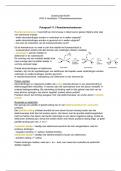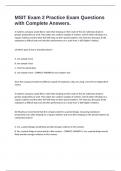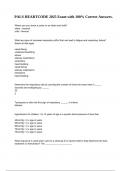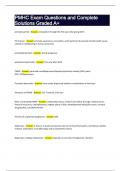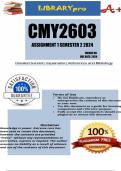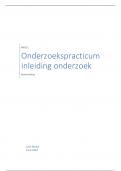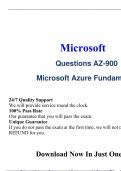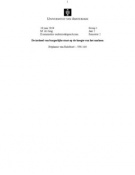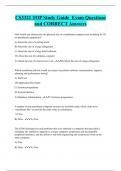Hoofdstuk 4: BLAST BASICS
➢ Why use BLAST?
♥ BLAST (Basic Local Alignment Search Tool) allows rapid sequence comparison of a query sequence against a database.
♥ The BLAST algorithm is fast, accurate, and web-accessible.
♥ BLAST searching is fundamental to understanding the relatedness of any favorite query sequence to other known
proteins or DNA sequences.
♥ Applications include
♪ identifying orthologs and paralogs
♪ discovering new genes or proteins
♪ discovering variants of genes or proteins
♪ investigating expressed sequence tags (ESTs)
♪ exploring protein structure and function
➢ Four components to a BLAST search
1. Choose the sequence (query)
2. Select the BLAST program
♪ BLAST programs
❖ blastn (nucleotide BLAST)
❖ blastp (protein BLAST)
❖ blastx (translated BLAST)
❖ tblastn (translated BLAST)
❖ tblastx (translated BLAST)
❖ wat doen ze: KENNEN!
•
3. Choose the database to search
♪ nr = non-redundant (most general database)
♪ dbest = database of expressed sequence tags
♪ dbsts = database of sequence tag sites
♪ gss = genomic survey sequences
♪ protein en/of nucleotide databases
4. Choose optional parameters
♪ Expect: verander het aantal verwachte hits door toeval en geef alles daaronder weer.
♪ Filter, mask: filter bepaalde dingen in sequenties weg. Bv herhalende stukken die matchen.
♪ You can...
❖ choose the organism to search
❖ turn filtering on/off
❖ change the substitution matrix
❖ change the expect (e) value
❖ change the word size
❖ change the output format
5. Then click “BLAST”
, ♥
➢ BLAST search output:
♥ taxonomy report summarizes species with matches
♪
➢ How a BLAST search works
♥ “The central idea of the BLAST algorithm is to confine attention to segment pairs that contain a word pair of length w
with a score of at least T.”
♥ BLAST: background on sequence alignment
♪ There are two main approaches to sequence alignment:
❖ Global alignment (Needleman & Wunsch 1970) using dynamic programming to find optimal alignments
between two sequences. (Although the alignments are optimal, the search is not exhaustive.) Gaps are
permitted in the alignments, and the total lengths of both sequences are aligned (hence “global”).
❖ The second approach is local sequence alignment (Smith & Waterman, 1980). The alignment may contain just a
portion of either sequence, and is appropriate for finding matched domains between sequences.
♪ BLAST is a heuristic approximation to local alignment. It examines only part of the search space.
♥ How the original BLAST algorithm works: three phases
♪ Phase 1
❖ compile a list of word pairs (w=3) above threshold T
➢ Why use BLAST?
♥ BLAST (Basic Local Alignment Search Tool) allows rapid sequence comparison of a query sequence against a database.
♥ The BLAST algorithm is fast, accurate, and web-accessible.
♥ BLAST searching is fundamental to understanding the relatedness of any favorite query sequence to other known
proteins or DNA sequences.
♥ Applications include
♪ identifying orthologs and paralogs
♪ discovering new genes or proteins
♪ discovering variants of genes or proteins
♪ investigating expressed sequence tags (ESTs)
♪ exploring protein structure and function
➢ Four components to a BLAST search
1. Choose the sequence (query)
2. Select the BLAST program
♪ BLAST programs
❖ blastn (nucleotide BLAST)
❖ blastp (protein BLAST)
❖ blastx (translated BLAST)
❖ tblastn (translated BLAST)
❖ tblastx (translated BLAST)
❖ wat doen ze: KENNEN!
•
3. Choose the database to search
♪ nr = non-redundant (most general database)
♪ dbest = database of expressed sequence tags
♪ dbsts = database of sequence tag sites
♪ gss = genomic survey sequences
♪ protein en/of nucleotide databases
4. Choose optional parameters
♪ Expect: verander het aantal verwachte hits door toeval en geef alles daaronder weer.
♪ Filter, mask: filter bepaalde dingen in sequenties weg. Bv herhalende stukken die matchen.
♪ You can...
❖ choose the organism to search
❖ turn filtering on/off
❖ change the substitution matrix
❖ change the expect (e) value
❖ change the word size
❖ change the output format
5. Then click “BLAST”
, ♥
➢ BLAST search output:
♥ taxonomy report summarizes species with matches
♪
➢ How a BLAST search works
♥ “The central idea of the BLAST algorithm is to confine attention to segment pairs that contain a word pair of length w
with a score of at least T.”
♥ BLAST: background on sequence alignment
♪ There are two main approaches to sequence alignment:
❖ Global alignment (Needleman & Wunsch 1970) using dynamic programming to find optimal alignments
between two sequences. (Although the alignments are optimal, the search is not exhaustive.) Gaps are
permitted in the alignments, and the total lengths of both sequences are aligned (hence “global”).
❖ The second approach is local sequence alignment (Smith & Waterman, 1980). The alignment may contain just a
portion of either sequence, and is appropriate for finding matched domains between sequences.
♪ BLAST is a heuristic approximation to local alignment. It examines only part of the search space.
♥ How the original BLAST algorithm works: three phases
♪ Phase 1
❖ compile a list of word pairs (w=3) above threshold T



